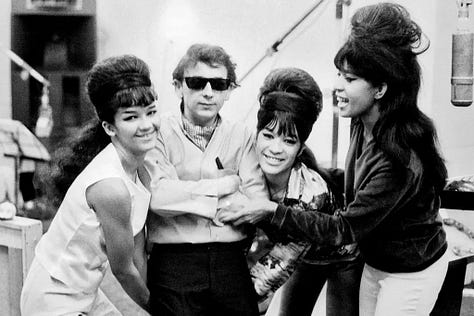
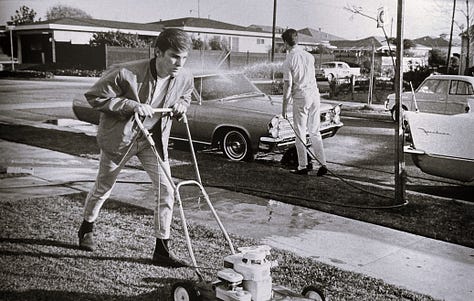
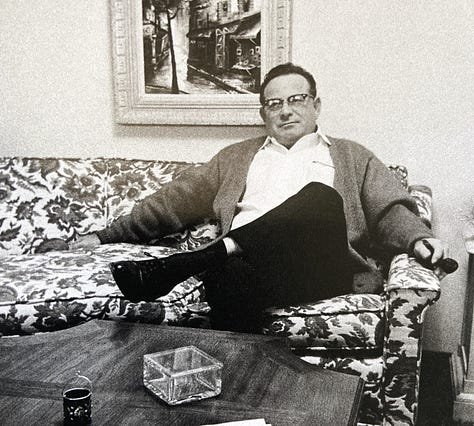
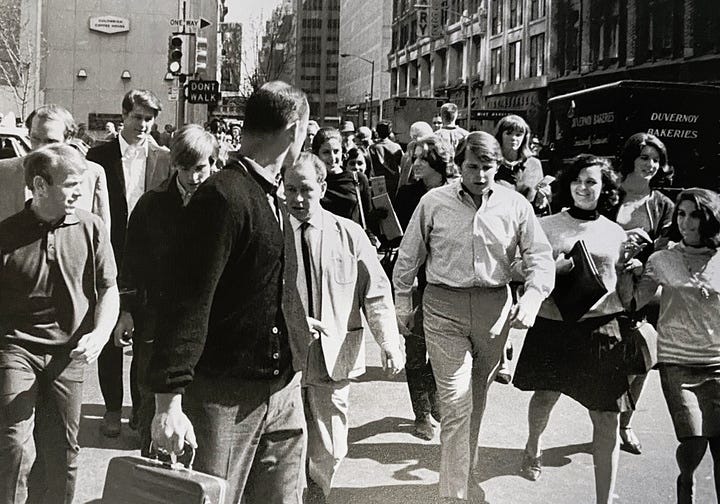
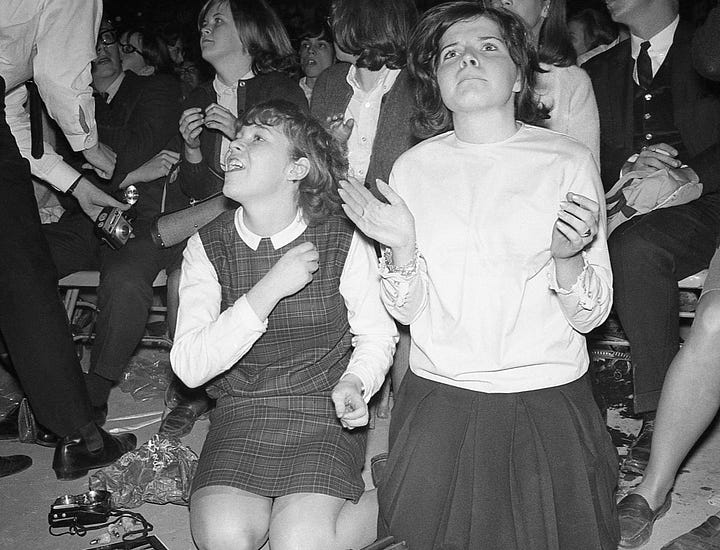
This post finds Brian Wilson and the Beach Boys in the midst of the turbulent year of 1964. The last several posts have focused on the unavoidable subject of Brian’s father, Murry Wilson—dealing with Murry’s opposition to “Fun, Fun, Fun,” at the end of 1963; his conduct during the Beach Boys’ January ‘64 tour of Australia and the group’s desire to fire him as manager; his confrontation with Brian during the April recording session for “I Get Around” and his actual firing; his brief stint of depression and his marital troubles. And also, as detailed in the preceding post, Murry’s return as manager and songwriter for the Sunrays with the “Car Party”/“Outta Gas” single. Though forgettable as music, these songs survive as evidence of Murry’s orientation toward Brian, and what Brian had been coping with: a controlling, jealous father who was opposed to Brian’s success, maturity, and independence.
Having left off in the last chapter with the Sunrays’ debut in the fall of ‘64, Part 22 now backtracks to the spring, for the first in a series of posts focusing on some of Brian’s musical decisions in 1964, in the wake of Murry’s dismissal.
The “I Get Around” single first entered the Billboard chart in May 1964, ascending steadily toward No. 1 throughout the month of June (around the same time Murry Wilson started to work with the Renegades/Sunrays). That same month, the Beach Boys recorded songs for their Christmas album, slated for release at the end of the year. And on June 22, in the midst of the Christmas sessions, they recorded a song called “Don’t Hurt My Little Sister.”
Back in 1961, Elvis Presley recorded the classic hit “Little Sister.” That was mid-tempo rock ‘n’ roll with a country-twang, paired with a borderline-skeezy lyric that maybe only Elvis could pull off. Brian Wilson’s “Don’t Hurt My Little Sister” in 1964 was written from another standpoint entirely. It recounted a scene of domestic teenage drama, in which the singer isn’t a seductive lothario but the little sister’s older sibling, who wants to protect the girl from being emotionally misused by an insensitive, unromantic boy.
The music (melody, chord progression) certainly isn’t bad, and the backing track is well-produced, but when voiced by the Beach Boys, “Don’t Hurt My Little Sister” somehow goes awry. Upon first impression, the song seems lyrically and vocally juvenile—even when judged according to the then-current teenage-pop standards of 1964 or ’65. Were it included on the Beach Boys’ All Summer Long (which was awaiting release within about three weeks and whose track listing was probably set by this point), it would have stood out as the most childish track on the album. In retrospect, the unavoidable point of comparison would be the early Beatles, who could get corny now and then but would never do something like this.
So why did Brian do it? Especially in these important weeks following Murry’s firing and the recording and release of the “I Get Around” single? Wasn’t “I Get Around” a sign of personal and/or artistic growth? Did Brian go through the trouble of firing his father just so he could do stuff like “Don’t Hurt My Little Sister?” After all, the song was in a way regressive; the scene it depicted seems like something a guy Brian’s age might have experienced as a high-schooler back in the 1950s.
Brian probably had two motivations. First, the song actually meant something to him—or it at least had relevance to his personal life, being rooted in his experience dating his high-school-aged girlfriend (and soon-to-be wife), Marilyn. Apparently, Marilyn’s older sister (maybe after seeing Marilyn get upset about something Brian said or did) told Brian to watch himself, saying something like don’t you hurt my little sister, Brian. In that warning, Brian heard the raw material for a song. But what kind of song? And for what audience? And who was supposed to sing it? The answer to that question points to Brian’s second—and probably more significant—motivation.
Notwithstanding the relevance of the song to his own romantic life, Brian conceptualized and wrote (with lyrical input from Mike Love, probably on the parts of the verses that Mike sings) “Don’t Hurt My Little Sister” in a mature, business-frame of mind—it was a knowing attempt to connect with the all-important teen-girl audience, in the manner of Phil Spector’s popular girl-group singles with the Crystals and Ronettes. Beatlemania aside, at this point Brian wasn’t nearly as affected or inspired by the Beatles’ recordings as he was Spector’s. Brian went so far as to submit “Don’t Hurt My Little Sister” to Spector, hoping the studio master himself would produce it for the Ronettes.
It seems Brian really wanted the Ronettes (or maybe another Phil-produced lineup) to sing the tune, not the Beach Boys. But Spector waved Brian off. In the end, the Beach Boys’ recording of “Don’t Hurt My Little Sister” would surface as “album filler” on Side One of Beach Boys Today in March 1965.
The fact that this recording sat on the shelf for nine whole months while other Beach Boys singles came and went suggests Brian’s awareness of its girly inappropriateness. (Its tone is not unlike “It’s My Party” or “My Boyfriend’s Back.”) In other words, maybe the problem with the song wasn’t so much that it was childish, but feminine—the Beach Boys were young men singing a lyric naturally suited for girls or young women, and it made no sense for the Boys to sing it. Had a girl-group recorded it, “Don’t Hurt My Little Sister” would have been just fine; the singers would have even sounded a little gutsy doing a song about sticking up for your kid sister.
In the end, Brian’s concept and basic lyric for “Don’t Hurt My Little Sister” was honest and true to the source—he set the words of Marilyn’s older sister to music. But in doing so, was Brian being entirely true to the Beach Boys band for which he was songwriter, producer and creative leader? When the group cut the song on June 22, Brian was physically present in the studio—as a Beach Boy, working as band-member and Beach Boys record producer—but his musical mind was in Spector-land, at Gold Star Studios with Phil, the Ronettes, and the “Wrecking Crew” session musicians.1 For that reason alone, this mostly forgettable Beach Boys recording survives as a harbinger of the conflict that would flare up between Brian and the Beach Boys in 1966-67, those controversial days when Brian would be writing and producing for the Beach Boys in name, but not substance.
Anyway, while “Don’t Hurt My Little Sister” would have been suitable (if not a sure-fire hit) for one of Phil Spector’s groups, it wasn’t what Brian really wanted for himself and the Beach Boys in the middle of 1964. And if that was the case, the question turns to what Brian did think was appropriate. For this, we have to look to the next Beach Boys single, the one to follow “I Get Around.” This was “When I Grow Up (To Be a Man)”/“She Knows Me Too Well,” released in August 1964.
With this single, the import of Murry Wilson’s firing comes into greater focus. To understand why, it’s necessary to first return to Brian’s childhood and family life, and try to get a sense of what the concepts of “growing up” and “manhood” would have meant for Brian specifically, as a person raised by Murry and Audree Wilson in Hawthorne, CA.
It should again be noted that Brian did not benefit from a sufficiently humane upbringing. He was savagely abused, with unpredictable regularity, throughout his childhood. The mistreatment went far beyond the boundaries of common “corporal punishment” methods or any reasonable (and necessary) parental discipline. Judged according to either the American cultural standards of 2025 or those of the 1940s and ‘50s, Murry Wilson’s actions were outrageous. Notwithstanding the rationalizations of his various champions, defenders, and apologists, Murry Wilson was not just like any other gruff, “old school” father of the postwar era. This is what Dennis Wilson—himself hardly a delicate flower—was trying to convey when he told a reporter in the mid-1970s, “I don’t know kids who got it like we did.”
Yet at the same time the Wilson home remained firmly intact. With the possible exception of Dennis (the wayward child who failed to quietly acclimate himself to the brutality and was repeatedly punished for it), the family was close-knit. Their interpersonal bonds somehow coexisted with the violence, and may have actually been strengthened by it (but not in a positive way). In other words, this was not one of those “broken homes” routinely associated with the underclass, the mean streets, the deadbeat fathers and drug-addicted mothers. What it was, rather, was a seemingly upstanding family that functioned, privately, as a domestic tyranny.
It could be that this type of family is historically common, and that it will always remain so; that what we now consider to be a reasonably normal or “healthy” family is in fact a freakish (and unsustainable) anomaly. But to justify such treatment as Murry did—as a moral and loving form of “security” for which the boys should be grateful, as children are “sometimes disappointed when they are not punished”—is only a pretense.2 The true underlying purpose is to inculcate a reflexive obedience in children through the use of cruel and capricious force. To inculcate a fear—that then provides the foundation for the family’s “morality,” “stability” and “love.” In the end, Murry did provide “security”—but only for himself, not the brothers. By beating and controlling them—by “scaring the hell out of his boys,” as Beach Boys publicist Derek Taylor came to understand during his time with the band in the mid-1960s—Murry remained secure in his self-image as a strong, capable, righteous, and loving father. (When the Beach Boys fired him, his long-held sense of security suddenly evaporated, and he retreated to bed.)
It is of course entirely proper that a father have an eye on the future, be concerned about the type of man his son will grow up to be, and then parent accordingly. With a father who is not just a drill sergeant but a mad tyrant, a male child such as Brian Wilson is expected—by the father and anybody aligned with him—to remain wretchedly dependent and subservient (at least until the father dies, at which point the son is at last free to carry forth the tradition and become god-emperor to the next generation of the family). In short, the young male’s progression toward a healthy manhood is stunted, thwarted, misshapen. It is no coincidence that Murry’s tune for the Sunrays, “Car Party,” concludes with the chastened teen-narrator declaring his dependency on his father—that is, his subordination. Likewise, by seizing control of Brian’s songs via the Sea of Tunes publishing company back in 1962 (see Part 9), Murry acted to restore what he believed to be the proper natural order between father and son: the fruit of Brian’s labor and creativity belonged to Murry.3
In this mode of child-rearing and family relations, a growing child’s maturity and independence—physical, intellectual, financial, sexual—is fraught with tension and conflict. Growing up can be viewed (or felt) as an ethical and moral transgression, something that threatens and destabilizes the family itself. A child’s increasing capacity to recognize, feel, and navigate complex emotions is similarly contentious, as it too signifies impending maturity and individuation. During Brian’s childhood and adolescence in Hawthorne, the normal and healthy expression of human feeling had been, at best, risky—practically forbidden under severe penalty. The fact that Murry would beat the boys, and then beat them more if they cried (again, as remembered by Dennis) indicates that they were not supposed to feel anything real.
Murry did not want Brian to express himself, just as he did not want him to be a real adult. However, music was permitted.4 As a youth, Brian naturally adapted and began to channel his emotional existence, or humanness, into music. His engagement with music and in particular, Four Freshmen-style vocal harmony, was like oxygen in an otherwise suffocating atmosphere. But at the same time, Brian’s non-musical development—socially, as a normal person in the everyday world—probably lagged behind.5 Although by 1964 Brian was progressing toward “genius” status in terms of music, he was not necessarily on track to become an autonomous, adequately responsible adult—a man.
He wanted to get there, however. And he would, of course, use music to do it.
Continue reading in Part 23 of A History of Brian Wilson
Selected References for Part 22
Beautiful Dreamer: Brian Wilson and the Story of Smile. Directed by David Leaf. DVD: Rhino Home Video, 2005.
Fromm, Erich. Greatness and Limitations of Freud’s Thought. New York: Harper & Row, 1980.
Gabler, Neal. “The Beach Boys: Riding a New Wave.” New Times, April 2, 1976.
Gaines, Steven. Heroes and Villains: The True Story of the Beach Boys. New York: Dutton/Signet, 1986.
Greven, Philip. Spare the Child: The Religious Roots of Punishment and the Psychological Impact of Physical Abuse. New York: Knopf, 1991.
Mead, Margaret. And Keep Your Powder Dry: An Anthropologist Looks at America. New York: William Morrow and Company, 1965.
Miller, Alice. Banished Knowledge. New York: Anchor Books/Doubleday, 1990.
Perry, Bruce D. and Oprah Winfrey. What Happened To You?: Conversations on Trauma, Resilience, and Healing. New York: Flatiron Books, 2021.
Williams, Paul. Brian Wilson & The Beach Boys: How Deep Is The Ocean? New York: Omnibus Press, 1997.
Wilson, Brian, and Ben Greenman. I Am Brian Wilson. Boston: Da Capo Press, 2016.
Wilson, Murry. Letter to Brian Wilson. May 8, 1965. Collection of Hard Rock International/Hard Rock Memorabilia.
The implicit question concerns the state of the Beach Boys’ knowledge as of the day they recorded “Don’t Hurt My Little Sister” in June. If Brian had not yet submitted the song to Phil Spector, did the Beach Boys know that they were basically recording a demo for Brian to submit to Phil? Would Brian have told them that was his intention for the song? If on the other hand, Brian had already submitted the song and been (effectively) rejected as of the June 22 session date, did the Beach Boys know they were recording a girl-group number that wasn’t intended for them? If so, would they have wondered why they should be singing this tune? Did they care? Did anybody care, or was June 1964 too early a time to be bothered with such questions?
The quote comes from Murry’s May 1965 letter to Brian. What Murry appears to be getting at here is children’s need for rules, boundaries, and authoritative parenting (from a father). In that respect, he wasn’t wrong—a child would be rightfully “disappointed” not to have these things. However, Murry was not authoritative as a father, but authoritarian, meting out violence and warped, disproportionate punishments for the sake of inflicting pain. In his letter to Brian—in which he copped to administering not only spankings but “more violent punishment”—Murry used the valid principle of authoritative parenting to justify his sadism.
Readers may be familiar with Murry’s controversial and injurious 1969 decision to dissolve the Sea of Tunes publishing company and sell the song catalog—an act which required Brian’s signature. The sale is often characterized as a head-scratcher, with Murry’s paternal decency and common sense taken as assumed: why on earth would “Dad” sell the catalog, and for such a seemingly small sum of money? What is always overlooked is the injustice and exploitation implicit in the company’s initial formation in 1962: a man abuses his son for years; the son nevertheless manages to excel in music; the son finds his way into the business, meets up with a potential partner and wants to go into the songwriting business—only to have the abuser step in and seize the songs as his own property, as if by right. (By the time of the sale, Murry had become sole shareholder of Sea of Tunes.) Murry’s decision to sell the catalog was entirely consistent with how the entity was originally formed. It was simple: the songs belonged to Murry, and he was free to do with them what he wanted. By 1969, Murry knew Brian was a burnout, and that the Beach Boys were over, eventually to be forgotten. It was time to cash out before the catalog further decreased in value.
For commentary on the special “musical space” that Murry allowed Brian in childhood, see Part 7 of this History series (“Father and Son”).
In David Leaf’s 2005 documentary Beautiful Dreamer: Brian Wilson and the Story of Smile, Brian hinted at the problem (inadvertently) when he said that “because my dad would hit me so much,” it wasn’t until Brian’s junior year in high school when he could “finally relax,” stand upright, and “walk around like a man.” One inference to be taken from this is that Brian arrived at a certain stage of personal development—how to “walk” at school without fear—later than other boys his age.


